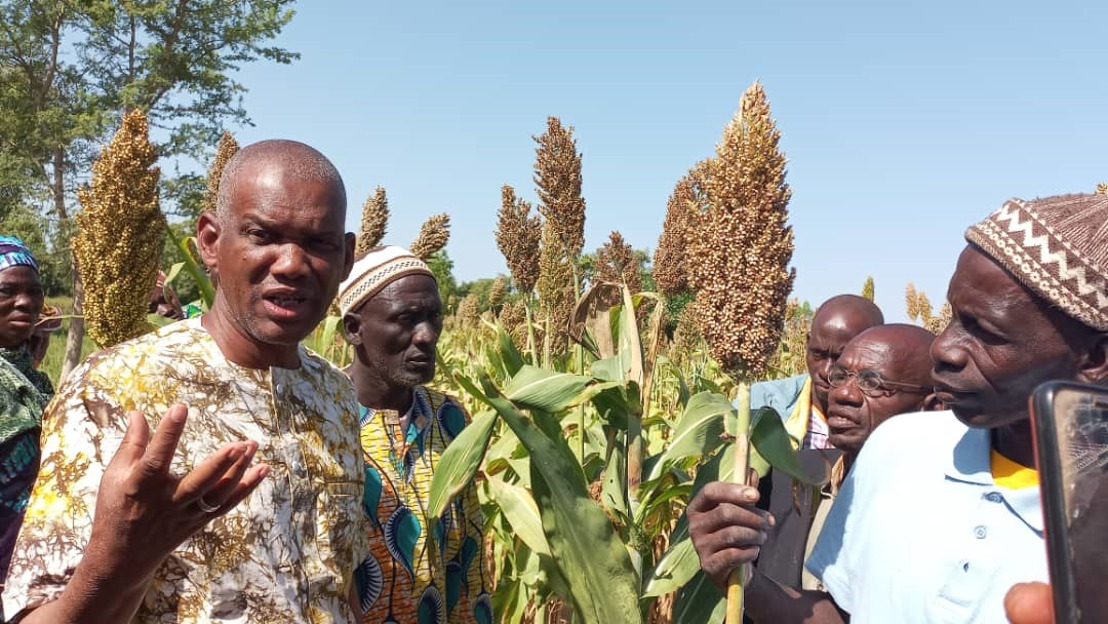New varieties of climate-resilient and highly nutritious crops bring hope to rural communities in Koulikoro, Ségou, Kayes and Sikasso regions of Mali.
Farmer field days held in Mali during the pre-harvest season, October and November 2022, have led to increased adoption of new varieties of sorghum, millet, groundnut and cowpea by farmers. Heads of the agriculture sector in these regions report of increased demand for seed of these improved varieties that are high-yielding and drought tolerant.
The field days were facilitated by partners of the ‘Improving crop productivity and climate resilience for food and nutrition security’ project (EU-APSAN-Mali). The aim was to showcase the performance of improved technologies and facilitate learning among partners. Over 40,000 Malian smallholder farmers are beneficiaries of the project.
Farmer and partner testimonials
Mr Souleymane Mariko, beneficiary of the project from the village of Zantièbougou in Bougouni, Sikasso, says:
“This year, I grew the new sorghum varieties Samboni, Soubatimi, Tiandougoucoura and the local control variety. Though the fertilization and crop regimen was the same for all, the improved varieties with a short cycle proved to be more resilient. The grain yield was significantly higher (more than 1 ton per hectare), and the quality of fodder was superior with better palatability.”
”The demonstration plots are important for creating awareness. At first, I was not very enthusiastic, but visits to the plots and exchanges with other producers, made me see their advantages. Their climate resilience and higher yields has ensured that I have enough to feed my family and surplus to sell,” says Mariko.
Mr Karamoko Sako, Director of the NGO EUCORD, implementing partner of the EU-APSAN-Mali project activities in the communities of Faragouran and Zantiébougou in the Bougouni region, says:
“Farmers are happy with the improved varieties of millet, sorghum and cowpea and the demand for seeds is rising sharply. The two innovation platforms that have been set up are an asset for future commercial activities.”
Seed distribution and seed fairs in project regions
In 2022, as part of the project, the local union of cereal producers (ULPC) distributed 257 mini bags of sorghum, cowpea, groundnut and millet seeds in the project intervention areas. A total of 240 producers, including 81 women, benefited from the mini bags. To enable producers to start the campaign with good quality seeds, ULPC organized four seed fairs at the local level, particularly in village markets. More than 200 producers took part in these fairs that provided a platform for exchanges on crop performances between producers and seed vendors’ committees and an opportunity to raise producers’ awareness on the use of varieties promoted by the project. The ULPC also participated in the national seed exchange of Mali in 2022.
Impact in Koulikoro region
The ULPC has facilitated more than 44 field demonstration and trials of new varieties of sorghum, millet, groundnut and cowpea involving 54 producers, including 16 women in the Koulikoro region.
“As part of the seed multiplication activities for the 2022-2023 season, the ULPC produced seeds of 10 varieties of sorghum (OPVs and hybrids) on a total area of 35.92 hectares. A total of 41 producers participated,” said Mr Yalaly Traore, Head of the ULPC farmers’ organization.
Impact in Kayes region
Mr Samba Bengaly, Head of Agriculture Sector of the Kayes region said that visits to the test plots and demonstrations of the improved varieties allowed farmers to appreciate the different varieties in terms of cycle, drought resistance, plant vigor, foliage and yield per hectare compared to local controls.
“Soon after the field days, there has been a strong demand for hybrid seeds this year due to their higher yields and drought resistance,’’ Mr Samba Bengaly said.
Mr Diakaridia Dao, Head of the Agricultural Sector of the Kita region in Kayes, said that the project activities, the demonstration plot visits in particular, and other communication activities, contributed to better knowledge of the new varieties and created a high demand for seeds of improved varieties of sorghum (Soubatimi), millet (Maïwa C1), groundnut (ICGV99029) and cowpea (Acar1, Jiguifa and Simbo).
More than 25,000 people visited and commented on interviews with producers through social networks, especially Facebook. More than 11,800 people listened on radio to the testimonies of 83 producers on the performance of seeds of these varieties in the agricultural sector of the Kayes region.
“Improved varieties of sorghum, millet, cowpea and groundnut have been valued in the Kayes circle for their short cycle, drought resistance and yield compared to local varieties. The sorghum variety Soubatimi has a yield of 2-3 tons per hectare compared to less than 1 ton per hectare for most local varieties,” says Mr Yaya Doumbia, Chief of the Agriculture Sector of Kayes.
Other popular new sorghum varieties include the dual-purpose Séguifa variety, appreciated for grain and popular as fodder because of the sugar content in the stem. Three new varieties of early-maturing and high-yielding sorghum (Sabanafanté, Dougouyiriwa and Fagola) produced in the previous season are also popular in the target communities.
Launched in 2019, the EU-APSAN-Mali project is funded by the European Union Commission in Mali. It is implemented by ICRISAT in partnership with the Institute of Rural Economy, agricultural extension services and NGOs in the regions of Koulikoro, Ségou, Kayes and Sikasso.
From left to right: A group of women farmers in the village of Karala, Kita region, and a farmer in Sikasso region, answers to questions from local media during a field visit. Photo: Diakaridia Dao, Agriculture Sector, Kita and Karamoko Sako, EUCORD, Mali.
Project: Improving crop productivity and climate resilience for food and nutrition security (EU–APSAN-Mali)
The project is part of the European Union’s ‘Development of smart innovation through agricultural research’ (DeSIRA) programme.
Partners: Institute of Rural Economy, farmers’ organizations (Local Union of Cereal Producers – ULPC, Sene Yiriwaton, Cooperative of Seed Producers of Mande – COOPROSEM, Union of Farmers of the Tominian Circle – UACT, Union Nyeta, USCPMD), Extension Services of Mali, NGOs (Mali Agricultural Market Development Trust – MALIMARK, European Cooperative for Rural Development – EUCORD, Association Maline pour la Souveraineté et la Sécurité Alimentaire – AMASSA, Centre d’Appui d’Autopromotion et de Développement – CADD, Association Malienne d’Éveil au Développement Durable – AMEDD) and seed companies (Société de Production de Semences Amélioration – SOPROSA, Camara Semence, Dounkafa, Faso Kaba), CERAAS, CORAF and Universities.


Leave a Reply